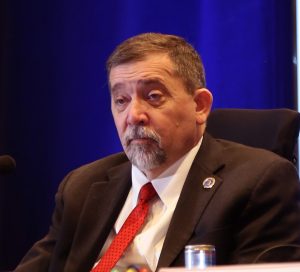Advocacy and Legislation Seminar key points
By Charles Brown
As Paralyzed Veterans of America (PVA) goes into its virtual Advocacy/Legislation Seminar March 7–11, here are the key points that will be our focus.
Chapter leaders and advocates will be together online from around the country to continue the mission of advocating for the health care, benefits, accessibility and disability civil rights PVA members have earned through their military service and sacrifices.
The beginning of the week will have attendees participating in multiple sessions designed to educate and train them on PVA’s key priorities and prepare them to meet with their legislators later in the week.
This is a short review of priorities PVA will be discussing and advocating for this year.
Protect Department of Veterans Affairs’ (VA) specialized services: We’re constantly working to protect VA specialized services, including the spinal-cord injury and disease (SCI/D) system of care and will be seeking full funding for these programs.
Improve VA staffing: We’ll be looking for opportunities to better compensate (specialty pay, bonuses, etc.) medical personnel who directly care for SCI/D veterans at VA facilities.
Caregiver program expansion: We’re monitoring the implementation of the program’s expansion and will be working to protect veterans’ rights to appeal VA decisions involving this program. We’ll be advocating to make sure Phase 2 implementation begins no later than Oct. 1.
Improve access to VA’s long-term services and supports: Expand the Veteran Directed Care program to all VA medical centers and ensure it is implemented fully within each facility’s catchment area; increase availability of the Homemaker and Home Health Aide program and the number of VA foster homes; give veterans the
means to retain their caregivers even when hospitalized; and advocate for more VA SCI/D long-term care centers. PVA will also be working with Congress on ways the VA can improve compensation and the availability of direct care workers who care for veterans.
Asset and Infrastructure Review Commission: We’ll be monitoring the work of the commission and supporting, as appropriate, the addition or renovation of VA SCI/D facilities.
Assisted reproductive technologies (ART): PVA will be seeking permanent access to in vitro fertilization and will work to expand both the eligibility for and the types of ART the VA makes available to veterans with SCI/D.
VA health care and benefits for women veterans with SCI/D: PVA will be advocating for the VA to meet the needs of women veterans with catastrophic disabilities and consider their unique needs in developing programs and providing services targeted to the broader female veteran population.
Improve access to transportation for veterans: The cost of replacing an adaptive vehicle is large, so PVA is seeking an additional automobile grant for veterans with service-connected SCI/D. The organization also wants to expand the VA’s list of reimbursable items through the Automobile Adaptive Equipment program and enable the VA to provide greater adaptation assistance to veterans with non-service-connected conditions.
Housing: PVA wants to increase the VA’s Home Improvements and Structural Alterations grant rates to ensure they match real-world and veterans’ needs. The current rates were established more than a decade ago.
Clothing allowance: PVA wants to repeal the burdensome need for veterans with static conditions to reapply for their allowances every year. This is an unnecessary burden for the veteran and the VA.
Survivors: PVA is always working to improve benefits for veterans’ survivors and, specifically, wants Congress to pass legislation that would allow survivors of veterans who died of service-connected amyotrophic lateral sclerosis to receive the Dependency and Indemnity Compensation kicker ($305.28 per month in 2022).
Education: PVA will be working with Congress to improve the Veteran Readiness and Employment (VR&E) program so it meets the needs of catastrophically disabled veterans. VR&E is, first and foremost, an employment program for veterans with disabilities. However, it doesn’t have equitable access for catastrophically disabled veterans. Severely disabled veterans are often denied enrollment in VR&E because of physical limitations due to their injuries, despite VR&E’s mission to empower disabled veterans by assisting them to find gainful employment.
As you read through the list, remember we are all advocates for better health care, increasing benefits and improved accessibility around our country.
Some of us advocate on a daily basis around our local communities. Some of us advocate through our state legislatures, and some of us are afforded the opportunity to advocate with national legislatures and leaders.
For years, I’ve participated at each of these levels. This year, I’m tasked with speaking directly to our representatives about VA health care and the need to protect and improve the quality of care given to our nation’s heroes.
I’ll rigorously defend the care we receive while fighting for improving the care that’s lacking around our country and leaving some of our heroes in crisis.
I don’t want to hear of another veteran who couldn’t get into the VA for critically needed care and ended his or her life in despair and pain.
I’m asking each of you to reach out to your representatives and demand that your nation’s veterans be treated with the respect and honor they have earned.
Be safe, and remember that your voice and actions can make someone else’s life better.



